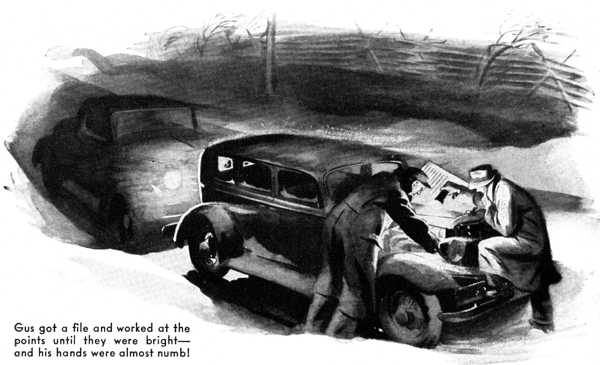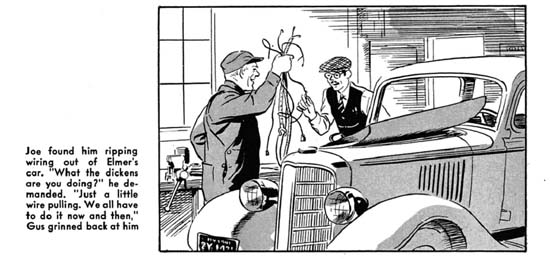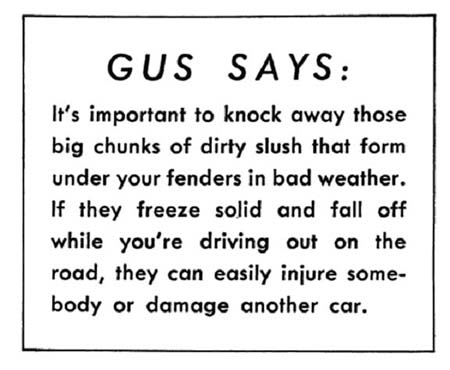March 1942
by Martin Bunn
Sometimes it costs less to spend more on your car.
The bankers call it covering your investment,
but in the Model Garage it's just common sense.

It was just turning dark outside when Joe Clark came into the Model Garage shop and found his partner Gus Wilson sitting on the end of his workbench placidly smoking his pipe and contemplating a floor entirely clear of cars.
"If you haven't got anything to do," Joe said a little caustically, "I should think that you'd pick out a more comfortable seat to do it in. I don't see how the dickens you . . . "
The telephone in the office interrupted.
"There's the 'phone, Joe," Gus said. Joe hurried away. Gus continued to smoke placidly. After half a minute he heard Joe call him, and went into the office.
"Elmer Jones on the wire," his partner informed him. He says he's stalled four miles out on the dirt road, and wants you to tell him what to do about it."
Elmer is a mild young man who clerks in the local chain store and who, in his off hours, enjoys wandering about the surrounding country in an old crate which seldom actually breaks down but which always has something or other the matter with it. His voice over the wire sounded deeply discouraged.
"I'm sure stuck this time!" he wailed.
"Had to walk pretty near a mile to get to this phone, and it's colder than the dickens out here. I've never had anything as bad as this happen to me before. I don't know what I'm going . . . "
"What's the matter with your car?" Gus cut in on his talk of woe.
"I dunno," Elmer groaned. "She just won't run, that's all. She began to misfire, and I stopped the motor to find out what was the matter. I couldn't find anything wrong, but when I tried to start her up she wouldn't even turn over. I've tried pretty near everything I know, and it's getting dark and awful cold!"
"Take it easy -- take it easy," Gus said soothingly. "I'll come out. Just where are you now?" Elmer told him. "All right, I know the house," Gus said. "You stay there and keep warm. I'll pick you up."
The last of the daylight was fading and snow rode a blustery gale when Gus turned his old but immaculate roadster off the cement of the highway onto the icy ruts of a little-used country road. It was black dark before his headlights picked up the white farmhouse at the roadside from which Elmer had telephoned him.
Elmer, who had been waiting on the porch hurried out and jumped into the roadster nervously. "I'm worried about my lights -- I didn't turn 'em on," he fussed.
"I pushed my car a little off the road, but someone might run into it."
"They might -- but there isn't much chance that they will. There isn't much traffic on this old road," Gus reassured him. He drove on steadily, and in a few minutes they stopped alongside of Elmer's balky sedan.
Gus got into it and stepped on the starter.
Nothing happened. "Feels to me as if your battery has gone dead," he said. "Well, the first thing is to get your job back to town -- when we've done that it'll be easy enough to find out what's the matter with it. Get in. I'll give you a push. You slide her into gear after I get her rolling. That'll start your engine if it's true the trouble is a dead battery."
Elmer got into his jalopy, and Gus maneuvered his roadster behind it and then edged it out onto the road. Then, starting slowly and evenly, he gave it a long push.
But the engine stubbornly refused to take hold.
Gus swore under his breath -- Elmer had been right about it being cold out here in the country. "Guess I should have brought the wrecker," he said. "But I didn't, so we'll have to do the best we can without it.
Let's see, now," he got his flashlight, raised the hood, and started a quick inspection.
"How long have these distributor points been in?" he demanded after a minute.
"Only a couple of weeks," Elmer told him. "They're almost new."
Gus grunted. "They're badly burned and pitted," he said. "Probably that is why your car won't start when we push it." He got a file out of his car's tool case, and worked at the points until they were clean and bright -- and until his hands were almost numb. "Well, let's see what another push will do," he said.
Again he pushed Elmer's car down the road. For perhaps 20 yards nothing happened. Then the engine started, sputtered noisily for a moment, and then ran smoothly. Elmer stuck his head out and looked back. "Keep going!" Gus yelled at him. "Don't let your engine stop, for Pete's sake!"
Around a curve down the road headlights gleamed whitely from an approaching car.
Elmer switched on his lights in a hurry. Gus saw them flare up to abnormal brightness -- and then go black. A moment later a car roared past, its driver yelling something at them. And with a dying sigh, Elmer's motor stopped again.
Gus got out and went up to the other car. Elmer seemed close to tears. "She missed a few times, and then went dead on me," he explained.
Gus looked at his watch. "No use fooling around any longer," he decided. "I haven't got a tow chain or rope with me, so I can't haul you in. I'll push you down to that farmhouse that you called me from, and phone Wally to come out with the wrecker and bring your car in."
"That's all right," Elmer said, "but how much is all that going to cost me? I've just paid for some work I had done on this darned bus, and I'm sorta broke."
"Don't worry too much about that," Gus told him. "I'll make the towing charge light -- I should have come out in the wrecker in the first place. That's my mistake."
Gus telephoned to the garage for the wrecker. Then they parked Elmer's car in the farmyard, and started for home. Gus dropped Elmer at his boarding house. "I'll look over your job in the morning," he said.
"Right now I'm heading for the Park House and my dinner. When I've finished eating it, all I'm going to do is to find me a good hot radiator and sit on it until bedtime. Boy, am I cold!"
That night the mercury nose-dived to five below, and all next morning Gus was kept busy with frozen radiators and the numerous other motoring mishaps which always crowd repair shops the morning after an exceptionally cold night. As a result, he and his eager-to-learn but highly inexpert mechanic Wally weren't able to make a start on Elmer Jones's trouble-shooting job until after lunch hour.
Then Gus looked at the distributor points, and saw that they were as badly burned and pitted as they had been before he had cleaned them the afternoon before. He turned to Wally. "You get the floor boards up and test the battery," he told the grease monkey.
Ten minutes later Wally came over to his workbench with a hydrometer in his hand.
"The battery's O.K., Boss," he reported importantly. "The hydrometer readings of all the cells are pretty near the same and they're all over one point two fifty."
"Well, what does that prove?" Gus demanded.
"It proves the battery's charged," Wally said.
Gus nodded. "That's right," he agreed.
"But if the battery is charged, why won't the starting motor start the engine?"
Wally scratched his beardless chin and shuffled his large feet. "I dunno," he admitted at last. "Why won't it?"
"I dunno either," Gus said. "Let's find out."
Just then Elmer came in, still looking badly worried.
"Hello," Gus greeted him. "Get yourself thawed out yet? I'm just getting started on your bus -- had the shop full of hurry-up cold-weather jobs all morning."
He went over to Elmer's car and turned a flashlight on its exposed battery. Both its braided ground strap and its battery cable were covered with poisonous-looking green corrosion and closer inspection showed that the battery cable was broken a couple of inches from the terminal.
"There's your trouble, Elmer," Gus said.
"It's your own fault too -- you've been too careless to keep your battery connections bright and clean, the way they always should be, and acid that has spilled out of the battery has corroded both the ground strap and the cable -- two of the most important links in a car's wiring system. The ground strap hasn't fallen apart, so far, but when you got on that rutted road yesterday afternoon the jarring snapped that corroded cable. That allowed the full voltage of the generator -- which goes considerably higher than the voltage of the battery -- to pass through your wiring system. Naturally with the battery cable broken the starting motor couldn't start the engine, and when we got it started by me pushing your car with mine the excessive voltage from the generator both burned out your lamp bulbs and burned your distributor points so badly that the engine couldn't keep on running. ."Well, here's the bad news, Elmer -- and it isn't nearly as bad as it might be. New points, a new battery cable, and new lamp bulbs will get your bus running again. I don't say that you will have a wiring system that I'd trust too far, but your car will run -- for a while, anyhow."
Elmer's face got red. "To tell you the truth, Mr. Wilson, I had an engine overhaul job done at a shop down in the city -- they gave me a low price, and they said that my wiring system was O.K. Could that be why the motor doesn't run as well as it did before they monkeyed with it?"
"More likely than not," Gus told him.
"You're always likely to have ignition trouble after an engine overhaul if you leave the old wiring in. Putting new pistons, rings and valves in an engine -- you had all that done, didn't you? -- always increases the compression. Well, that higher compression usually shows up ignition-system weaknesses that weren't noticed when the compression was lower.
Elmer did a job of serious thinking. "Well," he said at last, "I know that what you say about cars is always 100 percent right. Suppose you check over all my wiring, and phone me what should be done, and how much it will cost me? I've got to get back to the store."
"O.K.," Gus agreed. "I'll give you a call just as soon as I know the bad news."
Elmer hurried out. For five minutes Gus went over the car's wiring with his instruments. "Too much resistance everywhere," he said finally. "resistance, Wally, is a thief that robs you of your battery's juice. No wonder Elmer's engine hasn't been running right."
"What makes resistance?" Wally wanted to know.
"Oh, lots of things," Gus told him. "Loose connections, and corroded and frayed cables are among them, Cable that isn't big enough to do its job is a big resistance-maker.
Sometimes when cables are replaced the new ones that are put in aren't of as large gauge as the old ones were. Bad insulation causes voltage drop. It lets the juice leak out. If insulation is broken, frayed, hard, brittle, or oil-soaked, the cable or wire should be replaced."
While he had been talking Gus had been looking at and feeling various cables wires, and connections. Now he shook his head, got out a pad, and began to figure. "There's only one cure for Elmer's trouble," he said.
"That's an entire rewiring job."
He went into the office and gave Elmer the bad news over the telephone. When he told him how much the rewiring job would cost there was a lengthy silence at the other end of the wire. Then Elmer's voice said, a little weakly, "O.K. -- go ahead."
Late that afternoon Joe Clark came into the shop and found Gus ripping wiring out of Elmer Jones's car "What the dickens are you doing?" he demanded.
Gus grinned at him. "Oh, just a little wire pulling," he said. "We all have to do it now and then."
Joe grinned back. "Well, wire pulling is a good way to get ahead," he commented.
"Sure it is," Gus agreed. "And when the wiring system on a car is as thoroughly rotted out as it is on this bus, it's the only way to get ahead -- or to get anywhere else."
END
L. Osbone 2019

